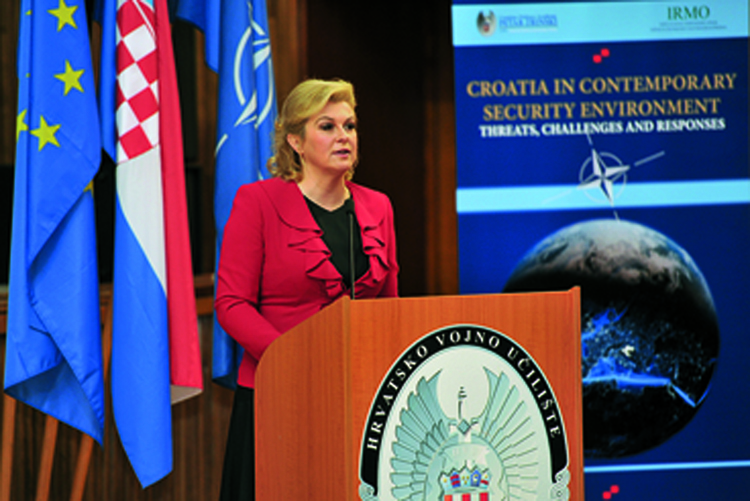On the day of the international recognition of the Republic of Croatia a third of…
The Conference “Croatia in contemporary security environment“ opened by President
 The President of the Republic of Croatia, Kolinda Grabar-Kitarović as the Supreme Commander of the Croatian Armed Forces on 15 June 2015 opened the international conference titled“Croatia in contemporary security environment –threats, challenges and responses“ held in the Croatian Defence Academy „Petar Zrinski“. The Conference is organised by the Centre for Defence and Strategic Studies and the Institute for Development and International Relations, sponsored by the NATO Public Diplomacy Division.
The President of the Republic of Croatia, Kolinda Grabar-Kitarović as the Supreme Commander of the Croatian Armed Forces on 15 June 2015 opened the international conference titled“Croatia in contemporary security environment –threats, challenges and responses“ held in the Croatian Defence Academy „Petar Zrinski“. The Conference is organised by the Centre for Defence and Strategic Studies and the Institute for Development and International Relations, sponsored by the NATO Public Diplomacy Division.
The opening session was attended by the Deputy Defence Minister, Višnja Tafra, the Chief of the General Staff, General Drago Lovrić, the Commander of the Croatian Defence Academy, Lieutenant General Slavko Barić, the representatives of the academic community and of the Diplomatic Corps to the Republic of Croatia and NATO. The participants include representatives of the Ministry of Defence and of the Croatian Armed Forces, of government and non-government institutions and organisations in regional and global security. In the opening address the President of the Republic stressed the rapidly changing contemporary world and the shift of traditional powers, bringing new challenges and opportunities; although at low risk of direct threats, Croatia has to keep an eye on the wider environment. “The membersip in NATO implies both privileges and obligations, calling for constant reassessment of Croatia’s security environment and the capabilities to respond to the challenges.. .Military transformation is a continuous process of adaptation of key policy and strategic documents(notably the National Security Strategy) and of our abilities to respond to current challenges and threats to national security“. The President also called on for internal debate and exchange of knowledge and cooperation with the Allies and international partners and organisations, by means of the conferences of the kind, with relevant topics, speakers and participants. Deputy Defence Minister, Višnja Tafra emphasised the responsibility of the defence system to defend the citizens and national interests and promote the shared values. „Small countries as Croatia don’t have a decisive role in countering the global threats but can provide a substantial contribution to the world peace and security by stabilising their respective environment and by playing a constructive role in multinational structures. The contribution by the Republic of Croatia to NATO significantly exceeds its size, and Croatia also supports the countries from the region aspiring for membership in the Euro-Atlantic integrations as relevant for peace and stability. The Conference was designed to contribute to the overall level quality of information and debate on the existing transatlantic values in the Croatian society and at the decision-making level alike and convey them to the aspirant countries. The Conference is divided into three panels –Panel 1: “Emerging trends, main challenges and threats in the contemporary EuroAtlantic and European security environment“, covering the impact of the Ukraine conflict for the relations between the West and Russia and for the Southeast Europe and Croatia; the menace of ISIS and and the impact of the economic crisis on defence expenditures and investments.  Panel 2, titled “Defence and security implications and responses to challenges and threats“ is focussed on recent events in Ukraine and in the Middle East and their implications for western countries defence systems, the European capacities to confront challenges and threats within the Common Foreign and Security Policy. A topic discussed within the panel included the role of NATO for the European security and the development of lacking capabilities within the Smart Defence Initiative, amd the national security challenges. Panel 3 “The role and position of the Republic of Croatia as a NATO and the EU members) in contemporary security environment and defence and security capabilities needed“ elaborated the existing civilian and military capabilities of the Republic of Croatia to counter challenges and threats and the balance between the national and Alliance capabilities; the border control and the preparation of the Republic of Croatia to enter the Schengen area; its current and potential role in the co-operative security within NATO and the EU and the view from a neighbouring country of Croatia’s current and potential role in the Southeast Europe.
Panel 2, titled “Defence and security implications and responses to challenges and threats“ is focussed on recent events in Ukraine and in the Middle East and their implications for western countries defence systems, the European capacities to confront challenges and threats within the Common Foreign and Security Policy. A topic discussed within the panel included the role of NATO for the European security and the development of lacking capabilities within the Smart Defence Initiative, amd the national security challenges. Panel 3 “The role and position of the Republic of Croatia as a NATO and the EU members) in contemporary security environment and defence and security capabilities needed“ elaborated the existing civilian and military capabilities of the Republic of Croatia to counter challenges and threats and the balance between the national and Alliance capabilities; the border control and the preparation of the Republic of Croatia to enter the Schengen area; its current and potential role in the co-operative security within NATO and the EU and the view from a neighbouring country of Croatia’s current and potential role in the Southeast Europe.
